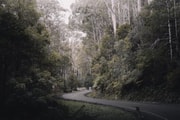Goodbye plastic, hello 'mushroom' packaging: the future of waste reduction
- Replies 8
A recent report has exposed the ugly truth about Australia's plastic waste problem. Apparently, Aussies consumed a mind-blowing 3.4 million tonnes of plastic in the past couple of years. That's equivalent to every man, woman, and child in the country getting through nearly 150 kgs of plastic!
And what's worse is that most of it ends up in landfills or directly in the environment, causing harm to our beloved wildlife and destroying our precious ecosystems.
But it's not just the land that's suffering. Our oceans are being choked by plastic pollution too.
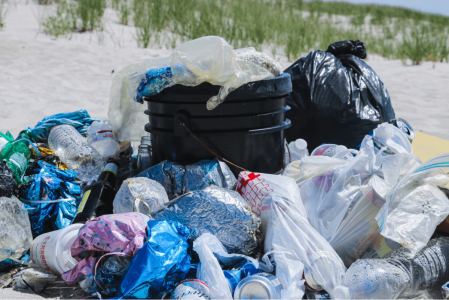
Single-use plastics, like plastic bags, straws, and cutlery, are the main culprits of this problem. We use them for a few minutes and then throw them away, where they often end up polluting the environment.
And despite efforts to reduce the use of single-use plastics through government policies and awareness campaigns, the amount of plastic waste just keeps growing.
That's probably why more and more Aussies are stepping up to take action and find sustainable solutions for plastic waste management. Take this startup company, for example!
A Melbourne start-up company is joining a growing global effort to divert organic waste from landfill, and they're doing it with a twist - by using mushrooms!
Fungi Solutions was launched in 2020 by Camben Cooke and Amanda Morgan with the aim of reducing waste and preventing tonnes of carbon pollution. The innovative packaging uses the root network of fungi, mycelium, combined with organic waste to grow and create compostable packaging.
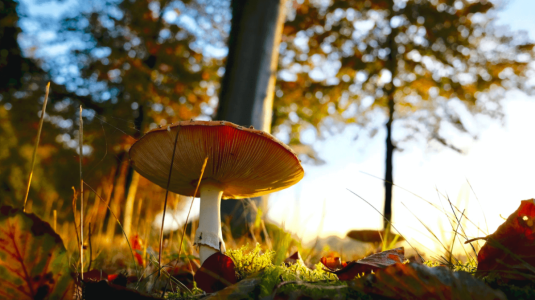
So, how does this new packaging from Fungi Solutions work?
Imagine taking organic waste that would otherwise be clogging up landfills, like agricultural leftovers and commercial scraps, and turning it into a revolutionary new packaging material. That's exactly what their process does.
They start by breaking down the waste and infusing it with mycelium, the underground network of fungi that acts like nature's recycling system.
Then, they carefully shape the mixture into a mould and allow it to grow in a warm, dark environment for seven days. The result is a solid, eco-friendly packaging material that rivals traditional options like polystyrene.
In Morgan's words, it's ‘like polystyrene and cardboard had a baby’, with all the great performance of the former and the biodegradable properties of the latter.
Once you're done using it, simply compost it in your garden, and it'll disappear back into nature without leaving a trace of waste. How good is that, eh?
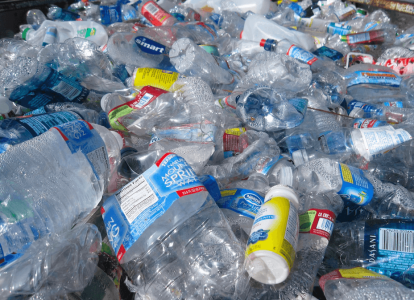
As a nation, we are facing a grave crisis when it comes to plastic waste. According to Australian Packaging Covenant chief executive Chris Foley, the situation is dire, and it's high time we take action.
Each year, a staggering 6.3 million tonnes of packaging is produced in Australia, yet only a mere 54% of it is recycled.
That means a significant amount of plastic packaging ends up in landfills, and from there, it can have devastating impacts on our environment, from polluting our waterways to littering our streets.
The Australian government has set an ambitious goal of eliminating all single-use plastic packaging by 2025, and ensuring that all packaging is recyclable, reusable, or compostable.
But with the pandemic, a lack of sustainable infrastructure, and even the recent suspension of the REDcycle program, we're falling behind.
We need new and innovative solutions to this problem, now more than ever. It's time to rise to the challenge and create a greener, cleaner future for all Australians.
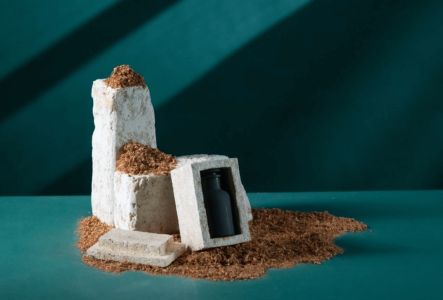
The idea of using mushroom packaging made from organic waste that would otherwise end up in landfills is not only an innovative solution to our waste problem, but it's also crucial in the fight against climate change.
As Dr Simon Lockrey, the head of the reduce program at Fight Food Waste Cooperative Research Centre at RMIT explains, food loss and waste accounts for a significant portion of global emissions, between 6 to 8%.
That's why it's essential to minimise food waste and packaging can play a crucial role in that.
But what makes a material truly sustainable? According to Dr Lockrey, it's all about the life cycle of the packaging.
For something to be considered sustainable, it must have a low-impact throughout its entire life cycle, from material intensity, production intensity, transportation, and the number of times it's used. Compostable packaging is a great option, as long as the production and transport process is low emission and it's properly composted, and not left to release methane in landfills.
Fungi Solutions hope to eventually have their packaging found on supermarket shelves and in the future, Cooke and Morgan believe 'myco-cycling' facilities could pop up across the country.
'People are looking for more new, regenerative and natural solutions to packaging,' said Morgan. 'We're hoping to see the process scaled up so we can meet the volume of demand.'
'The solution is simple: reduce and save waste from landfill, re-use and make new products, and recycle. With the help of mycelium we can revolutionise waste.'

Members, this breakthrough by Fungi Solutions is an exciting advance in our battle against plastic waste, but despite the impressive progress, there's still a long way to go until compostable packaging is commonplace.
Until then, remember to recycle, reuse and reduce any waste you can - and if you know anyone else who might be interested in knowing more about the fight against plastic, why not share this article with them?
And what's worse is that most of it ends up in landfills or directly in the environment, causing harm to our beloved wildlife and destroying our precious ecosystems.
But it's not just the land that's suffering. Our oceans are being choked by plastic pollution too.

The issue of plastic waste is one of Australia's most pressing challenges at present. Credit: Unsplash/Brian Yurasits.
Single-use plastics, like plastic bags, straws, and cutlery, are the main culprits of this problem. We use them for a few minutes and then throw them away, where they often end up polluting the environment.
And despite efforts to reduce the use of single-use plastics through government policies and awareness campaigns, the amount of plastic waste just keeps growing.
That's probably why more and more Aussies are stepping up to take action and find sustainable solutions for plastic waste management. Take this startup company, for example!
A Melbourne start-up company is joining a growing global effort to divert organic waste from landfill, and they're doing it with a twist - by using mushrooms!
Fungi Solutions was launched in 2020 by Camben Cooke and Amanda Morgan with the aim of reducing waste and preventing tonnes of carbon pollution. The innovative packaging uses the root network of fungi, mycelium, combined with organic waste to grow and create compostable packaging.

Cooke and Morgan hope to develop compostable packaging made from mushrooms as an alternative to single-use plastics. Credit: Pexels/Matthias Zomer.
So, how does this new packaging from Fungi Solutions work?
Imagine taking organic waste that would otherwise be clogging up landfills, like agricultural leftovers and commercial scraps, and turning it into a revolutionary new packaging material. That's exactly what their process does.
They start by breaking down the waste and infusing it with mycelium, the underground network of fungi that acts like nature's recycling system.
Then, they carefully shape the mixture into a mould and allow it to grow in a warm, dark environment for seven days. The result is a solid, eco-friendly packaging material that rivals traditional options like polystyrene.
In Morgan's words, it's ‘like polystyrene and cardboard had a baby’, with all the great performance of the former and the biodegradable properties of the latter.
Once you're done using it, simply compost it in your garden, and it'll disappear back into nature without leaving a trace of waste. How good is that, eh?

Australia has a national target to remove all single-use plastic packaging by 2025, and for all packaging to be recyclable, reusable or compostable. Credit: Unsplash/tanvi sharma.
As a nation, we are facing a grave crisis when it comes to plastic waste. According to Australian Packaging Covenant chief executive Chris Foley, the situation is dire, and it's high time we take action.
Each year, a staggering 6.3 million tonnes of packaging is produced in Australia, yet only a mere 54% of it is recycled.
That means a significant amount of plastic packaging ends up in landfills, and from there, it can have devastating impacts on our environment, from polluting our waterways to littering our streets.
The Australian government has set an ambitious goal of eliminating all single-use plastic packaging by 2025, and ensuring that all packaging is recyclable, reusable, or compostable.
But with the pandemic, a lack of sustainable infrastructure, and even the recent suspension of the REDcycle program, we're falling behind.
We need new and innovative solutions to this problem, now more than ever. It's time to rise to the challenge and create a greener, cleaner future for all Australians.

The organic waste is mixed with mycelium and packed into a mould to grow into the desired shape, like a bottle holder. Credit: Instagram/fungisolutions.
The idea of using mushroom packaging made from organic waste that would otherwise end up in landfills is not only an innovative solution to our waste problem, but it's also crucial in the fight against climate change.
As Dr Simon Lockrey, the head of the reduce program at Fight Food Waste Cooperative Research Centre at RMIT explains, food loss and waste accounts for a significant portion of global emissions, between 6 to 8%.
That's why it's essential to minimise food waste and packaging can play a crucial role in that.
But what makes a material truly sustainable? According to Dr Lockrey, it's all about the life cycle of the packaging.
For something to be considered sustainable, it must have a low-impact throughout its entire life cycle, from material intensity, production intensity, transportation, and the number of times it's used. Compostable packaging is a great option, as long as the production and transport process is low emission and it's properly composted, and not left to release methane in landfills.
Fungi Solutions hope to eventually have their packaging found on supermarket shelves and in the future, Cooke and Morgan believe 'myco-cycling' facilities could pop up across the country.
'People are looking for more new, regenerative and natural solutions to packaging,' said Morgan. 'We're hoping to see the process scaled up so we can meet the volume of demand.'
'The solution is simple: reduce and save waste from landfill, re-use and make new products, and recycle. With the help of mycelium we can revolutionise waste.'
Key Takeaways
- A start-up packaging company in Melbourne is diverting organic waste from landfill using fungi.
- They combine fungi and organic waste to create compostable packaging.
- This new packaging has the potential to reduce waste, reuse and recycle, ultimately revolutionising waste management, according to the company.
- Australia has a national target to remove all single-use plastic packaging by 2025 and for all packaging to be recyclable, reusable or compostable.
Until then, remember to recycle, reuse and reduce any waste you can - and if you know anyone else who might be interested in knowing more about the fight against plastic, why not share this article with them?







